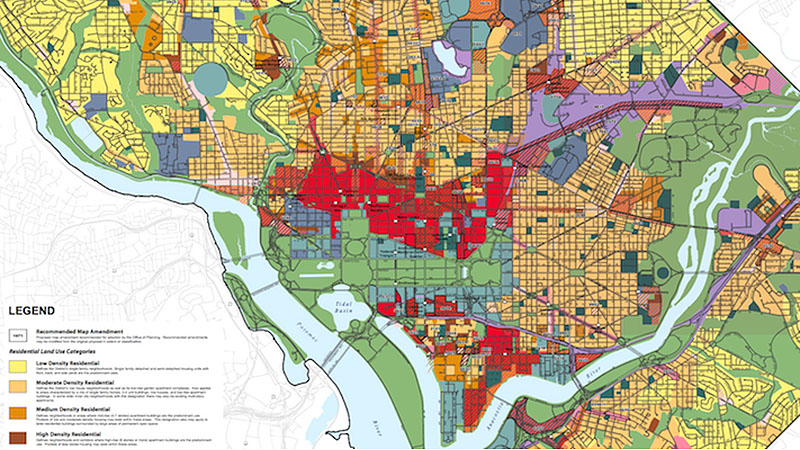The Inclusionary Zoning Program (IZ) requires that most new and some renovated residential developments include a minimum number of affordable units for rent or sale. Those eligible enter a lottery that assigns these units. C100 in testimony on IZ urges its application in the Downtown; correction of flaws in the formula for the Expanded IZ program that could produce less affordable housing; lowering of eligibility maximums; and expanding the requirements to require a greater percentage of affordable housing in new developments.
Document Library
- Inclusionary Zoning
C100 Comments on ZC Case No. 23 08
Shelly Repp
In asking for PUD flexibility, Wesley has turned the regular IZ program into a pretzel. In short, the modified IZ program proposed by Wesley is a square peg that doesn’t fit in the round IZ hole. The precedent could have city-wide implications that could undermine the IZ program to the detriment of eligible DC residents. There is a way to include DHCD administered IZ units as part of a student residence program, but this isn’t it. The Applications should be denied.
C100 Testimony OP Roundtable on Affordable Housing
Shelly Repp & Laura Richards
At an Office of Planning Roundtable November 1, 2022 on ways to encourage affordable housing, Shelly Repp testified for the Committee of 100 that now is the time for the Office of Planning to recommend application of the Inclusionary Zoning Program (IZ) to the current exempt downtown zones. We stated that the IZ Program is one tool available to address current office vacancies and create a vibrant, livable and diverse downtown.
C100 ZC 21-05 Comment On Office Conversions To Housing IZ Phase #2
Nancy MacWood
Comments on the potential conversion of existing office buildings, especially in the downtown area, for residential purposes, noting that currently the Inclusionary Zoning (IZ) program does not apply to the downtown area.
C100 Comments Zoning Commission IZ Formula
Kirby Vining
C100 submitted comments to the revised Expanded IZ formula, demonstrating through a painstaking analysis that Expanded IZ in some instances could produce fewer affordable units than would be produced under existing IZ provisions. C100 also questioned whether Expanded IZ would discourage the use of Planned Unit Developments (in favor of matter of right construction), thus limiting the public voice in planning.
C100 Comments Zoning Commission IZ
Kirby Vining
C100 wrote to urge the Zoning Commission not to hold a scheduled vote on final text amendments, citing a grave procedural flaw: the final rule text was based on a formula different from that advertised in the proposed rules issued for comment. The revised formula was one requested by a building industry trade association in comments filed on the last day for public comment. The Commission declined to accept C100's filing but nevertheless reissued the rule.
C100 Comments Expanded Inclusionary Zoning
Kirby Vining
C100 testified on proposed amendments to Zoning Regulations to create Expanded IZ, asserting the immense density increases would result in exchange for a relative handful of affordable units. C100 also noted the thinness of the public record and the outsize influence of the development community in dr. C100 urged further consideration before draft rules were issued for public comment. The Zoning Commission proceeded with the rulemaking.
C100 Testimony Office of Planning Case 20 02 Enhanced IZ
Kirby Vining
C100 testified at the Office of Planning’s July 15, 2020 Roundtable on Case 20-02: Enhanced IZ, arguing both that existing IZ has some problems not dealt with at all by Enhanced IZ, and the proposed Enhanced IZ also would allow map amendments for certain properties, thereby eliminating a contested case where benefits and harms could be entertained.
C100 Comments On Case 04 33I
Caroline Petti
At a time when building affordable housing is of the highest priority for our city, we're hard-pressed to understand why the Office of Planning IZ regulations arbitrarily limit the 10% Inclusionary Unit "Set-Aside". The 10% "Set-Aside" applies to stick-built construction (not the more expensive concrete and steel construction), but only in zones with a by- right height limit of 50 feet or less. The height limit of the underlying zone is irrelevant. All stick-built construction projects --regardless of the height limit of the zone they're located in -- should be subject to OP's 10% Inclusionary Unit "Set-Aside".
C100 Comments On DHCD IZ Implementation Proposal
Stephen A. Hansen, Kirby Vining, & Caroline Petti
In general, the Committee of 100 believes DHCD's proposal does a good job of addressing recent Zoning Commission changes to the IZ program as well as incorporating additional streamlining and flexibility into the program' s implementation without compromising its integrity or effectiveness. We do, however, have concerns about changes DHCD is proposing to the housing cost limitations currently found in Section 2213.5 (f) and (g) of the existing lnclusionary Zoning Implementation regulations. In pa11icular the Committee of 100 is concerned about DHCD's proposed changes to allow IZ households to spend as high as 50% of annual income on housing costs.
C100 Comments On IZ Proposed Rulemaking
Nancy MacWood & Caroline Petti
Comments on a range of issues pertaining to the inclusionary zoning regulations including: the targeted family income, size of units, applicability in DC's Downtown area, arbitrarily limited "Set-Aside" requirements, bonus density, height and lot occupancy requirements, bonus density and small residential projects (i.e., fewer than ten units), city's right-to-purchase inclusionary units, and off-site compliance.
External Resources
Department of Housing and Community Development Website — Information on the Inclusionary Zoning Program

